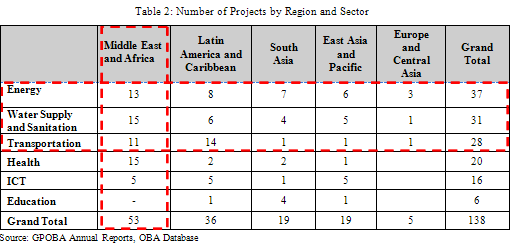所属部署 5th Research Department
氏名:LatikaLakhani
Undoubtedly, infrastructure development is a crucial focus area for all countries especially for under developed and developing countries. Most of the infrastructure projects are undertaken by governments since they are typically huge investments and have long gestation periods. However, various international and national development agencies such as the World Bank, the Asian Development Bank, and the African Development Bank also support infrastructure projects. Traditionally, the aid, subsidy, or funding has been provided at the beginning of the project. But these approaches do not always lead to the desired results due to structural and legislative issues such as corruption, political instability, delays in execution of project, terrorism etc. Thus, new approaches for financing infrastructure projects, such as Output Based Aid (OBA), Result Based Aid (RBA), Result Based Financing (RBF) and Program-for-Result (PforR), have been developed by the World Bank and other development agencies.
Under an OBA scheme, service delivery is contracted to an infrastructure provider involving both government and private companies. This provider receives a subsidy to complement or replace user fees. The infrastructure provider or a consortium of infrastructure providers and private companies is responsible for “pre-financing” the project until output delivery. The subsidy is paid only after the services or outputs have been delivered and verified by an independent verification agent.
Currently, the OBA scheme that is used most widely under a dedicated program is called GPOBA. GPOBA is a partnership of World Bank and the Department for International Development, United Kingdom, established in 2003. Later, other organizations, such as the International Finance Corporation (IFC), the Dutch Ministry of Foreign Affairs (DGIS), the Australian Agency for International Development (AusAID), and the Swedish International Development Cooperation Agency (Sida) joined the program.
The goal of GPOBA is to provide increased access to reliable basic infrastructure i.e. energy, information and communication technology, telecommunications, transportation, water, sanitation, health and education to people in developing nations using OBA. It provides financial subsidies and technical assistance to international financial institutions, non-governmental organisations, public and private infrastructure providers, and national and local governments to provide infrastructure to underserved areas.
During 2006-2009, GPOBA successfully implemented various OBA pilot projects in various sectors. Later on the team started implementing big projects as they gained experience.
1.Increase in disbursement of subsidies: Post 2006, the number of grants signed as well as disbursements are increasing manifold. The grants agreements for technical dissemination increased from USD 30 Million in 2007 to USD 130.7 Million in 2011. The disbursement of subsidy funding to service providers doubled to USD 48.3 Million in 2011 (Table 1).

2.Focus on Energy and Water Sector: The majority of the projects are undertaken in energy, water and transportation sectors. In terms of funding, water and energy sector attracted 41% and 36% of the total funding in FY 2011. The wide range of projects include implementation of UV water purification systems, rural electrification projects including both on grid and off grid, providing telephone and wireless access network, and designing and developing highways.
a.GPOBA developed an output based subsidy scheme for a rural electrification pilot project in the context of the Energy Reform and Access Project (ERAP) in Mozambique. The pilot was awarded to ElectroTec (Mozambique), Rural Maintenance Limited and Siemens (South Africa) and provided a fixed subsidy of USD 400 for each new eligible connection. The pilot intended to provide 3,000 new connections.
b.The Naandi Foundation (a non-profit organisation in India) partnered with Water Health India to seek funds from GPOBA for providing water purification and disinfection systems in rural areas in Andhra Pradesh, India. Water Health India is a subsidiary of Water Health International, a disinfection technology provider.
3.Focus on Africa and Middle East Countries: Currently, most of the projects have been undertaken in Africa and the Middle East As these regions are expected to witness high growth, there will be greater requirements for infrastructure such as roads, electricity etc. Some of the important countries are Nigeria, Kenya, Uganda, Zambia, Tanzania, and Mozambique.

GPOBA will continue to provide subsidies until 2013 from the current funds and will further replenish its funds from the development agencies that are currently providing funds. Post 2013, GPOBA will be recognized as a center of expertise, providing funding for technical assistance and dissemination, and promoting this concept to new national and international development agencies. For example: Energy Sector Management Assistance Program (ESMAP), Africa Electrification Initiative, Asian Development Bank, and UN’s Sustainable Energy For All program will apply the principle of OBA/RBF in their new plans to provide sustainable energy and development targets. Thus, in the future, development agencies will promote national and international infrastructure projects using this principle as it leads to desired results and maximum benefits.
Private companies, such as Siemens, WaterHealth International etc., participated in these pilot projects and leveraged this opportunity to build relationships with infrastructure providers and development agencies in major sectors such as energy and water. Now they are sharing their experiences and implementing various projects across geographies conducted by these development agencies.
機関誌「日立総研」、経済予測などの定期刊行物をはじめ、研究活動に基づくレポート、インタビュー、コラムなどの最新情報をお届けします。
お問い合わせフォームでは、ご質問・ご相談など24時間受け付けております。